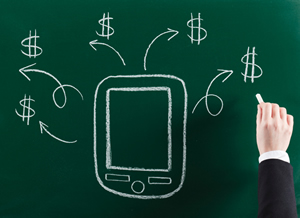
Will clearXchange Be a P2P Game Changer?
 It looks like there’s going to be a big rumble in the person-to-person payments jungle.
It looks like there’s going to be a big rumble in the person-to-person payments jungle.
An announcement last week that three of the nation’s largest banks—Bank of America, J.P. Morgan Chase and Wells Fargo—had teamed up to offer their customers a new person-to-person (or P2P for short) service called clearXchangesignals that these institutions are serious about taking on the industry leader, PayPal
Although details about the new clearXchange offering are somewhat scarce at this point, the three banks’ customers will be able to send money directly from their existing checking accounts to another party using just an email address or mobile phone number. This is pretty much what consumers have already been able to do through PayPal, which has used its Ebay Inc. connection to build a customer base of some 85 million users.
Not to be outdone, Google Inc. also announced last week plans to create a digital wallet that will permit consumers with Android smartphones to pay for their purchases with their credit or debit cards by waiving their phones in front of a special reader at the cash register. The card information would be linked to a special chip in the phone.
Both initiatives will most certainly accelerate the growth of mobile payments, which my colleague—Executive Vice President Al Dominick—has written about in several recent posts. But from the banking industry’s perspective, clearXchange offers the best hope to date that the fast-growing P2P market won’t end up being dominated by e-commerce heavyweights like PayPal and Google.
Hank Israel, a partner at the New York-based consulting firm Novantas, explains that the value of any payments network “is defined by the number of endpoints that it has.” Those endpoints are in fact customers, and Israel estimates that the three banks combined have about 25 million customers (minus some overlap for, say, BofA checking account customers who have a home mortgage with Wells or Chase credit card). With 85 million endpoints (i.e. customers), PayPal is still the “big bad gorilla” in the P2P market, says Israel.
But by all indications, clearXchange intends to open itself up to other banks in an effort to create as large a network as possible—which will be critical to its success. “It wouldn’t be in [clearXchange’s] advantage to say there’s a group of banks that it doesn’t want to be in the network,” says Steve Ledford, also a partner at Novantas. “The value of a network to everyone becomes greater—exponentially greater—the more participants you have.” A BofA spokesperson confirms that clearXchange is in discussions with other banks about joining the network.
Indeed, there are approximately 280 million individuals with checking accounts in the United States, according to Israel. And the average checking account has 360 transactions a year, compared to just 13 for PayPal—which means that a large bank owned network could eventually generate a sizeable customer base and very significant volume.
According to Israel, clearXchange would do well to embrace the digital wallet concept and incorporate additional payments options including credit cards since this would greatly increase the service’s utility. PayPal already allows its users to send P2P payments using a variety of mechanisms including multiple credit cards and transaction accounts.
While PayPal and Google would be formidable competitors for any fledgling e-commerce venture, clearXchange has other important advantages. PayPal requires its customers to set up a separate PayPal account in order to use its P2P service, while clearXchange’s bank customers will simply be able to use their existing credit and debit card accounts, which would appeal to those P2P users who prefer to deal with a single entity. And initially at least, Google’s new offering will be restricted to smartphones that use its Android operating software, and will also require merchants to install new point-of-sale technology. These factors may limit how quickly Google can build a customer base for its digital wallet.
Despite PayPal’s clear lead in the P2P market, Israel believes that clearXchange has a good opportunity to catch up. “To the extent they can work collaboratively, I think they’ll be very successful.”



